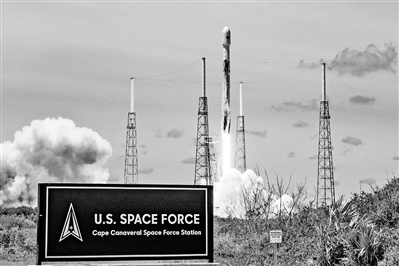
By Lin Yuan
The US Department of Defense established a Space Force component in the Indo-Pacific Command in November with a plan to set up a similar component within the US Forces Korea, picking up the speed of its space force development. The head of the electromagnetic operation unit of US Space Command said that the global space economy is expected to reach US$1 trillion by 2040, and the US military must move faster to occupy the commanding height in that domain considering how space combat capacities will affect future warfare.
However, the problems that come hand in hand with America’s accelerated space force development have been much denounced.
First, the development hasn’t proved effective when benchmarked against potential rivals. American media reported that in the past 10 to 15 years, America’s potential rivals like Russia have made much more headway in space capacity enhancement than the US. That’s why the Biden administration has to, under its overall framework of competitive strategy, focus on building space forces, creating environmental security of space, and deepening space alliance.
Second, the Space Force has unclear duties with other domestic agencies. There are always debates over the roles of the Space Force and the National Aeronautics and Space Administration (NASA). According to official descriptions, NASA is mainly responsible for exploring the solar system and the earth as well as other scientific research, while the Space Force is focused on preserving national security. But in reality, NASA has always been deeply engaged in national defense ever since its founding in 1958, and it overlaps with the Space Force regarding manned spaceflight and space defense technologies as well.
Third, the Space Force suffers from uneven allocation of resources compared with other military services. It is learned that most of the satellites of the US military are controlled by the Air Force, which competes with the Space Force for resources in many ways. Moreover, due to historical reasons, the US Army, Navy and Air Force each has their own space unit, resulting in decentralized management and multiple lines of command that have rather restricted the development of space capacity. This remains unchanged after the Space Force was established.
Analysts said the US has sped up its moves of “space militarization” in recent years, taking the space domain as a “commanding height” in major country competition. Two trends are worth special attention.
The first is the concentration of space capacities across the US military. Commander of the US Space Command James Dickinson recently said that the Space Command, Cyber Command, and Army Space and Missile Defense Command will work more closely together to integrate their capacities in space, cyberspace and special operations and form a “triad” deterrence against the rivals.
Senior officials of the US Air Force also said space information support capacity will be essential for combined operations across all domains, while military and commercial satellites as well as the ability to build them will be key to the military’s next-generation resilient space system. It’s foreseeable that “cross-service integration” and “military-civilian cooperation” will be the keywords in America’s space capacity development, with the aim of establishing a so-called highly decentralized and resilient space architecture featuring quick replenishment.
The other is the concentration of space capacities between the US and its allies. To enhance its presence in space, the Japanese Defense Ministry held a flag-awarding ceremony for its newly formed Space Operations Group at Japan Air Self-Defense Force’s Fuchu base in the suburbs of Tokyo. The British Defense Ministry recently released a document titled UK Space Power (JDP 0-40), the country’s first independent doctrine publication targeting the space domain.
It’s worth noting that these countries looked to the US while forming their own space operation forces or enacting space documents, hoping to enhance their space combat capacities through intensified military cooperation with Big Brother, including strengthening information exchange, coordinating military demand in the space, and conducting joint operations.













